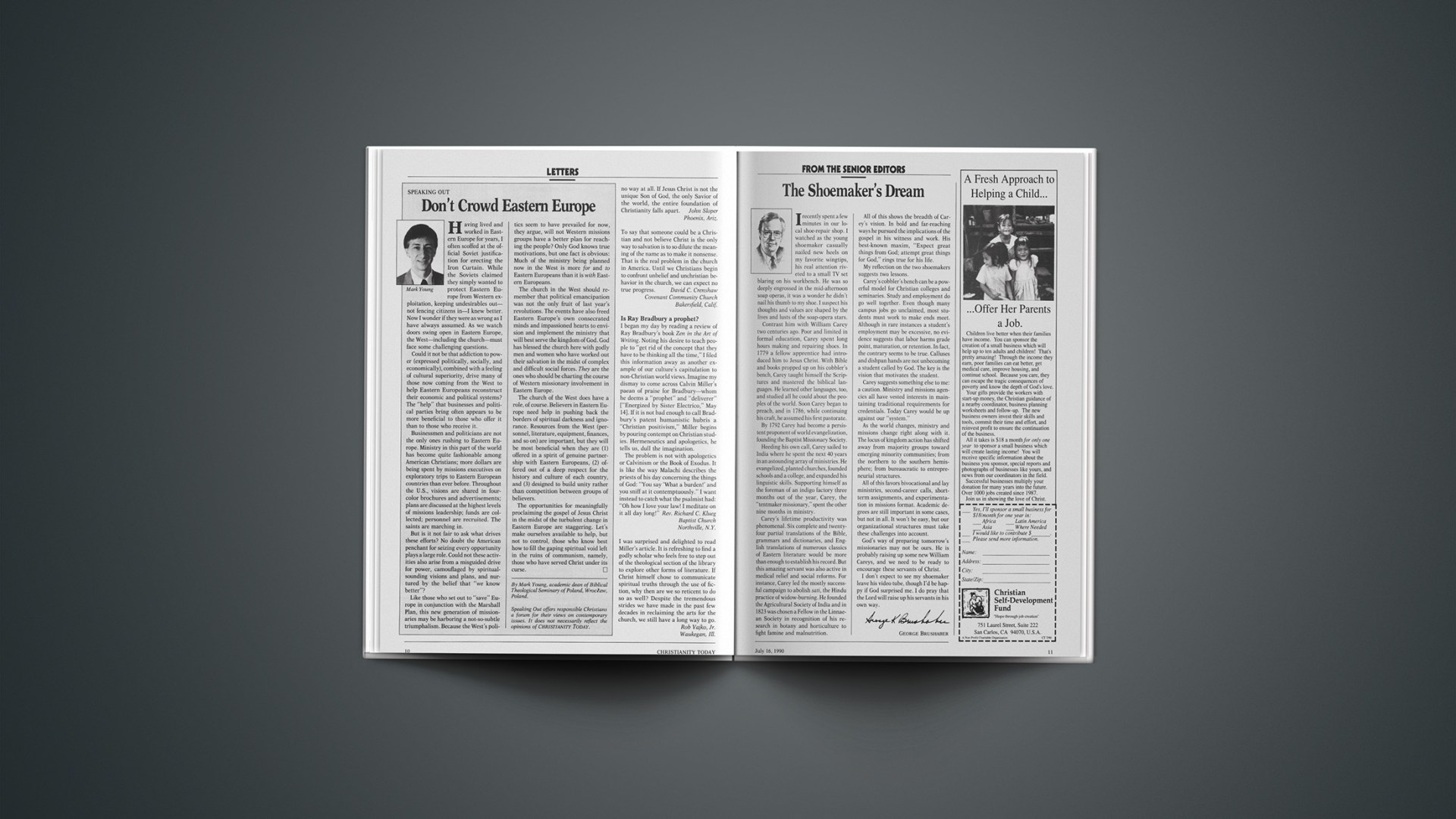I recently spent a few minutes in our local shoe-repair shop. I watched as the young shoemaker casually nailed new heels on my favorite wingtips, his real attention riveted to a small TV set blaring on his workbench. He was so deeply engrossed in the mid-afternoon soap operas, it was a wonder he didn’t nail his thumb to my shoe. I suspect his thoughts and values are shaped by the lives and lusts of the soap-opera stars.
Contrast him with William Carey two centuries ago. Poor and limited in formal education, Carey spent long hours making and repairing shoes. In 1779 a fellow apprentice had introduced him to Jesus Christ. With Bible and books propped up on his cobbler’s bench, Carey taught himself the Scriptures and mastered the biblical languages. He learned other languages, too, and studied all he could about the peoples of the world. Soon Carey began to preach, and in 1786, while continuing his craft, he assumed his first pastorate.
By 1792 Carey had become a persistent proponent of world evangelization, founding the Baptist Missionary Society.
Heeding his own call, Carey sailed to India where he spent the next 40 years in an astounding array of ministries. He evangelized, planted churches, founded schools and a college, and expanded his linguistic skills. Supporting himself as the foreman of an indigo factory three months out of the year, Carey, the “tentmaker missionary,” spent the other nine months in ministry.
Carey’s lifetime productivity was phenomenal. Six complete and twenty-four partial translations of the Bible, grammars and dictionaries, and English translations of numerous classics of Eastern literature would be more than enough to establish his record. But this amazing servant was also active in medical relief and social reforms. For instance, Carey led the mostly successful campaign to abolish sati, the Hindu practice of widow-burning. He founded the Agricultural Society of India and in 1823 was chosen a Fellow in the Linnaean Society in recognition of his research in botany and horticulture to fight famine and malnutrition.
All of this shows the breadth of Carey’s vision. In bold and far-reaching ways he pursued the implications of the gospel in his witness and work. His best-known maxim, “Expect great things from God; attempt great things for God,” rings true for his life.
My reflection on the two shoemakers suggests two lessons.
Carey’s cobbler’s bench can be a powerful model for Christian colleges and seminaries. Study and employment do go well together. Even though many campus jobs go unclaimed, most students must work to make ends meet. Although in rare instances a student’s employment may be excessive, no evidence suggests that labor harms grade point, maturation, or retention. In fact, the contrary seems to be true. Calluses and dishpan hands are not unbecoming a student called by God. The key is the vision that motivates the student.
Carey suggests something else to me: a caution. Ministry and missions agencies all have vested interests in maintaining traditional requirements for credentials. Today Carey would be up against our “system.”
As the world changes, ministry and missions change right along with it. The locus of kingdom action has shifted away from majority groups toward emerging minority communities; from the northern to the southern hemisphere; from bureaucratic to entrepreneurial structures.
All of this favors bivocational and lay ministries, second-career calls, short-term assignments, and experimentation in missions format. Academic degrees are still important in some cases, but not in all. It won’t be easy, but our organizational structures must take these challenges into account.
God’s way of preparing tomorrow’s missionaries may not be ours. He is probably raising up some new William Careys, and we need to be ready to encourage these servants of Christ.
I don’t expect to see my shoemaker leave his video tube, though I’d be happy if God surprised me. I do pray that the Lord will raise up his servants in his own way.










